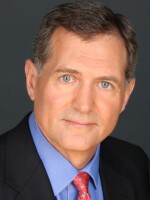AUDIE CORNISH, HOST:
From NPR News, this is All Things Considered. I'm Audie Cornish.
MELISSA BLOCK, HOST:
And I'm Melissa Block.
President Obama is leading a U.S. delegation to South Africa that includes three former presidents: Jimmy Carter, Bill Clinton and George W. Bush, to honor Nelson Mandela at a memorial service tomorrow. It's a unique show of respect for an extraordinary leader. But before he became a global icon, Mandela and his African National Congress had a complicated history with the U.S.
Greg Myre, the international editor for NPR.org, was based in South Africa from 1987 to 1993 and he's back there now. He joins us from Johannesburg. Greg, welcome.
GREG MYRE: Thank you, Melissa.
BLOCK: And let's talk a bit about this complicated history between Nelson Mandela and the United States, going back many decades.
MYRE: I think the important thing to remember here is the Cold War was the prism that defined the South Africa and U.S. relationship for many years. One administration after another supported and worked with the white leaders in South Africa. And these governments built the alliance on being bulwarks against communism.
In contrast to this, Mandela's African National Congress was very closely aligned with the South African Communist Party. And members from his group went to Moscow to receive military training and to study, for years at a time. And they tended to view the Soviet Union as being more sympathetic to their cause than the United States or other Western governments. And as part of this, the United States had even put the African National Congress on its terrorist list, where it remained for many years.
BLOCK: And, Greg, I've seen some reporting indicating that it is possible that it was even a CIA tip that led to Nelson Mandela's arrest.
MYRE: There have been reports like this. It has never been confirmed. But again, if true - and I have to stress that - it would certainly be plausible in the sense that there was close cooperation between these two governments, and communism was the thing they were looking out for. And Mandela was believed to be, if not a certainly a very close ally of the communists.
BLOCK: So when did the relationship change?
MYRE: Really, the defining moment came in the mid-1980s. Black South Africans launched a major uprising at that time. And for the first time, you really saw the South African story on American television screens and on the front pages of the newspapers on a regular basis. It was no longer just this episodic story. And in response to that politicians in the U.S. responded. Many started marching outside the South African Embassy in Washington, courting arrest. And they were, in fact, arrested.
You also saw the Congress passed sanctions against South Africa in 1986. Now, President Reagan vetoed those sanctions but the Congress then overrode him. And I think this is a very, very important moment. Because it showed that the attitude toward South Africa had shifted, this is no longer a Cold War story. It was an issue of morals and an issue of human rights.
BLOCK: And then, Nelson Mandela's release from prison, Greg, 1990, coincides with the end of the Cold War.
MYRE: That's right. And you really did see this change. Mandela became the hero and the icon that he is today. But there were still a few differences. He traveled to and met with Cuba's Fidel Castro and Libya's Moammar Gadhafi. He praised them as people who have supported him during lean times. When asked about them and their human rights records, he simply shrugged his shoulders and said: These were my friends in tough times and I continue to be loyal to them.
He also criticized the U.S. policy. He was very critical of the U.S. invasion of Iraq in 2003. And he also had taken issue with the U.S. approach to Iran's nuclear program.
BLOCK: So tomorrow, Greg, as all of these world leaders gather in South Africa for the memorial service, tell us just a bit about the stadium where that service is going to take place.
MYRE: This is a place that has a very important history here. In fact, Mandela had his first big rally there just days after he was released in Cape Town. He flew to the stadium - it's in Soweto, which is the big black community just outside Johannesburg. It's the biggest soccer stadium in the country, holds about 95,000 people. And some of our listeners may recall it - it was renovated for the World Cup in 2010.
And it looks at the giant African gourd. It has all sorts of panels - different panels in different earthen tones. And when it's lit at night, it looks like it's sitting on a ring of fire. So it's given this very strong African theme. It's a very striking place. It is also the place where Mandela made his last public appearance at the World Cup two years ago, so he never came out and appeared in public after that.
BLOCK: OK. NPR's Greg Myre in Johannesburg. Greg, thank you.
MYRE: Thank you, Melissa. Transcript provided by NPR, Copyright NPR.




